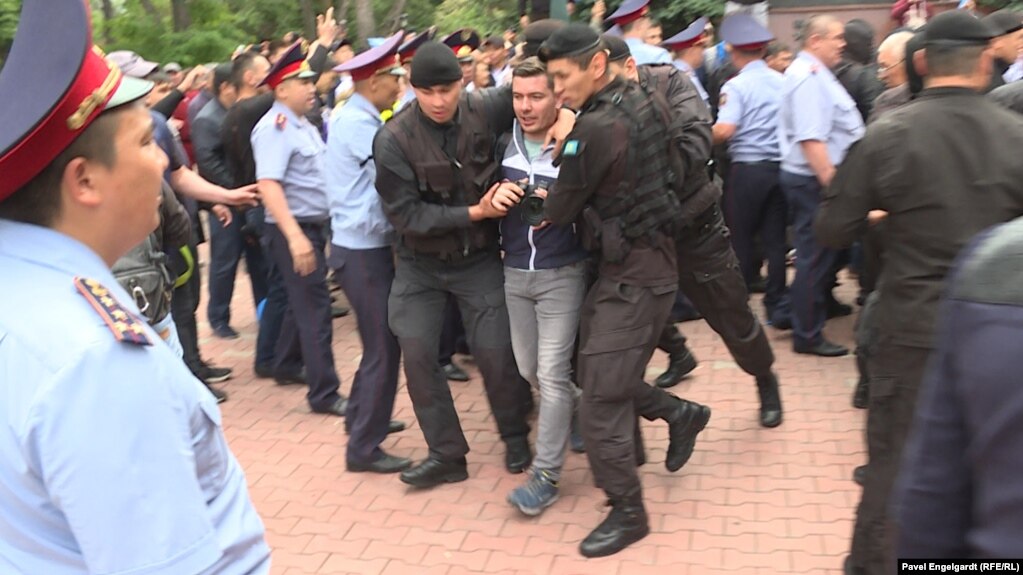RFE/RL Protests Kazakhstan’s Refusal To Accredit Journalists
Radio Free Europe/Radio Liberty (RFE/RL) has complained to the Kazakh government that its refusal to accredit two of its journalists.

WASHINGTON, D.C. — Radio Free Europe/Radio Liberty (RFE/RL) has complained to the Kazakh government that its refusal to accredit two of its journalists is the latest in a series of efforts over the last year to interfere with its operations inside the country.
In a February 19 letter addressed to Foreign Minister Mukhtar Tleuberdi, RFE/RL President Jamie Fly called the decision to deny credentials “arbitrary,” and said it “is just the most recent example of lawless behavior directed by your government toward our journalists,” who work with RFE/RL’s Kazakh Service, known locally as Radio Azattyq. One of the journalists, Sanat Urnaliyev, is an internationally recognized reporter who has worked with the Service since 2014.
Among a litany of actions that have breached domestic law and Kazakhstan’s international commitments, Fly pointed to a decision by the ministry last June to deny credentials to seven reporters with its Current Time network and Kyrgyz and Tajik Services one day before national polls to elect a successor to former President Nursultan Nazarbayev, who resigned in March last year. At the time, RFE/RL said the refusals directly interfered with RFE/RL’s mission to inform people in Kazakhstan about an event of “profound public interest.”
Fly told the minister that cases of harassment against Kazakh Service journalists in 2019 were “sufficiently serious and numerous” as to prompt RFE/RL to send a complaint in July to the office of newly elected President Qasym-Zhomart Toqaev, the country’s prosecutor-general, and several other cabinet members. The letter documented physical assaults by provocateurs, and arbitrary detentions and interrogations by authorities. It also accused Kazakh police of a “willful and repeated failure“ to act, even when journalists under assault appealed to officers nearby to stop the attackers – many wearing masks or wielding umbrellas. The letter has gone unanswered.
The Kazakh government’s refusal to credential RFE/RL journalists comes as authorities in nearby Tajikistan use accreditation in an effort to control the company’s operations there. Seven correspondents and staff with the Tajik Service have sought to renew their accreditations unsuccessfully for months, and in one case, two years; another 11 have been issued partial accreditations for 3- and 6-month periods, despite a requirement under local law that renewals be applied for on an annual basis.
Fly concluded the February 19 letter by urging the foreign minister to credential RFE/RL’s journalists promptly and uphold Kazakhstan’s international commitments, so that “our journalists can report for the people of Kazakhstan unimpeded, in safety, and without fear.”
RFE/RL’s Kazakh Service reports reliable news and information in both the Kazakh and Russian languages that state-controlled media is often unable or unwilling to provide, while serving as a platform for the free exchange of ideas. In 2019, the service’s azattyq.org website logged 27.8 million visits and 42.6 million page views. More than 764,000 people subscribe to its YouTube feed, and 413,000 follow its Instagram page.
For more information, contact press@rferl.org.
###
About RFE/RL
Radio Free Europe/Radio Liberty (RFE/RL) is a private, independent international news organization whose programs — radio, Internet, television, and mobile — reach influential audiences in 23 countries, including Russia, Ukraine, Iran, Afghanistan, Pakistan, the republics of Central Asia and the Caucasus. It is funded by the U.S. Congress through USAGM.